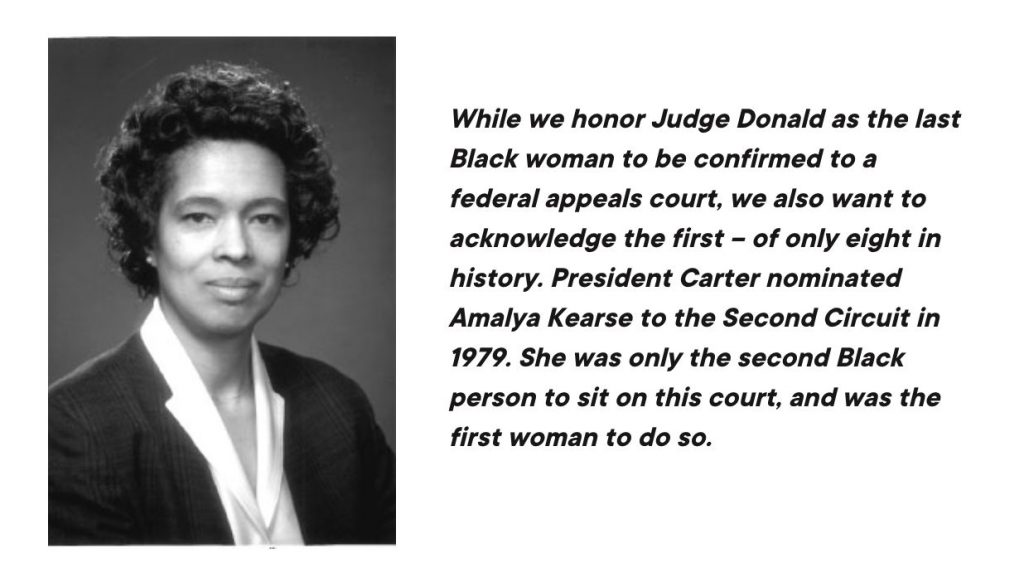We Need More Black Women on Our Federal Appellate Courts
Seven months after the death of civil rights lawyer and Supreme Court Justice Thurgood Marshall in 1993, the American Bar Association’s Commission on Racial and Ethnic Diversity in the Profession sponsored a memorial program to honor the legal giant.
At the event celebrating the life of Justice Marshall, Bernice Donald, at the time a U.S. Bankruptcy Judge in the Western District of Tennessee, spoke briefly about what Justice Marshall meant to her. “I owe my professional existence, my professional life, to him. I was one of those individuals who grew up as the child of sharecroppers in Mississippi, and it was through his work that I even dared to dream that I could one day become a lawyer and dared to have the courage to even have a career in the judiciary.”
Donald’s career as a judge was just getting started. Two years after that memorial, President Clinton nominated her to a federal district court in Tennessee after Odell Horton – the first Black federal judge in Tennessee since Reconstruction – assumed senior status (a form of semi-retirement that creates a new vacancy on the court). Six years later, President Obama appointed Donald to the Sixth Circuit. When the Senate confirmed her on September 6, 2011 by a vote of 96-2, Donald became the first Black woman to ever serve on that court.
Today, nearly a decade later, Judge Bernice Donald is still the last Black woman confirmed by the Senate to any federal appeals court – a shameful reality that persists because of Republican obstruction during Obama’s presidency and because of Donald Trump’s refusal to nominate any Black judges to the circuit courts.
In early 2016, President Obama nominated Myra Selby and Rebecca Haywood – both Black women with impressive legal credentials who would have added important and overdue diversity to our courts. Selby would have been the first Black woman from Indiana on the Seventh Circuit and Haywood would have been the first Black woman on the Third Circuit – but Republican senators from Indiana and Pennsylvania, respectively, blocked their nominations.
Once Trump took office, he refused to move Selby’s nomination forward and instead selected Amy Coney Barrett for that seat. He also replaced Haywood with Stephanos Bibas in what became a pattern of Trump replacing Obama’s nominees of color with white nominees. Over the course of his entire presidency, Trump’s record on judicial diversity was appalling. Of his 234 lifetime judges, more than 84 percent are white and more than 76 percent are men. Only two (not percent – two total) are Black women – who were both appointed to district court seats. Zero of his 54 circuit court judges are Black.

We need to call this what it is: an outrage for our courts and for our nation. When Trump took office, there were seven Black women serving on federal appeals courts. Three have since retired, and three of the remaining four are eligible to take senior status. Now, with President Biden set to begin making judicial nominations soon, he must prioritize restoring the diversity we’ve lost – and then advancing it even further. He has promised to nominate the first Black woman to the U.S. Supreme Court. President Biden must keep this promise, and do more to enrich all of our courts by nominating more Black women to serve in these lifetime appointments.
In 2021 and beyond, this administration must nominate for federal judgeships individuals who have a demonstrated commitment to civil and human rights, are fair-minded, possess a progressive vision of the law and Constitution, and are reflective and representative of the vast and rich diversity of our country – and that includes nominating Black women to the bench.
Because let’s be clear: Nearly a decade after Judge Bernice Donald’s historic confirmation, it is past time for the president to nominate – and for the Senate to confirm – more Black women. Our rights shouldn’t have to wait any longer.
"All of us bring the sum total of our lived experiences to the bench. It is the amalgamation of those experiences that help us produce a better quality of justice." – U.S. Circuit Judge Bernice Donald on why we need more Black women on the federal bench. #courtsmatter pic.twitter.com/wZhQyBBagR
— Alliance for Justice (@AFJustice) July 1, 2020